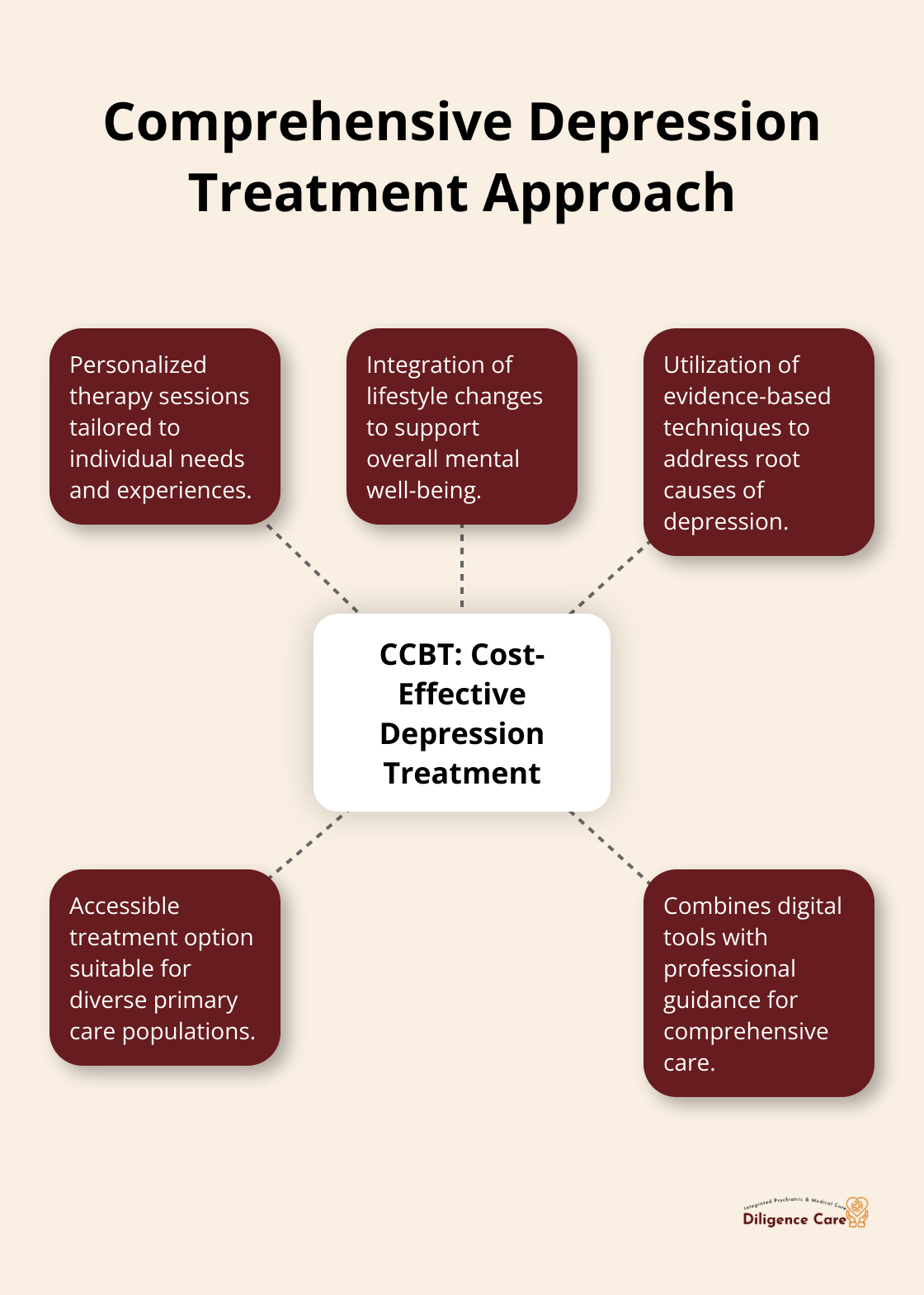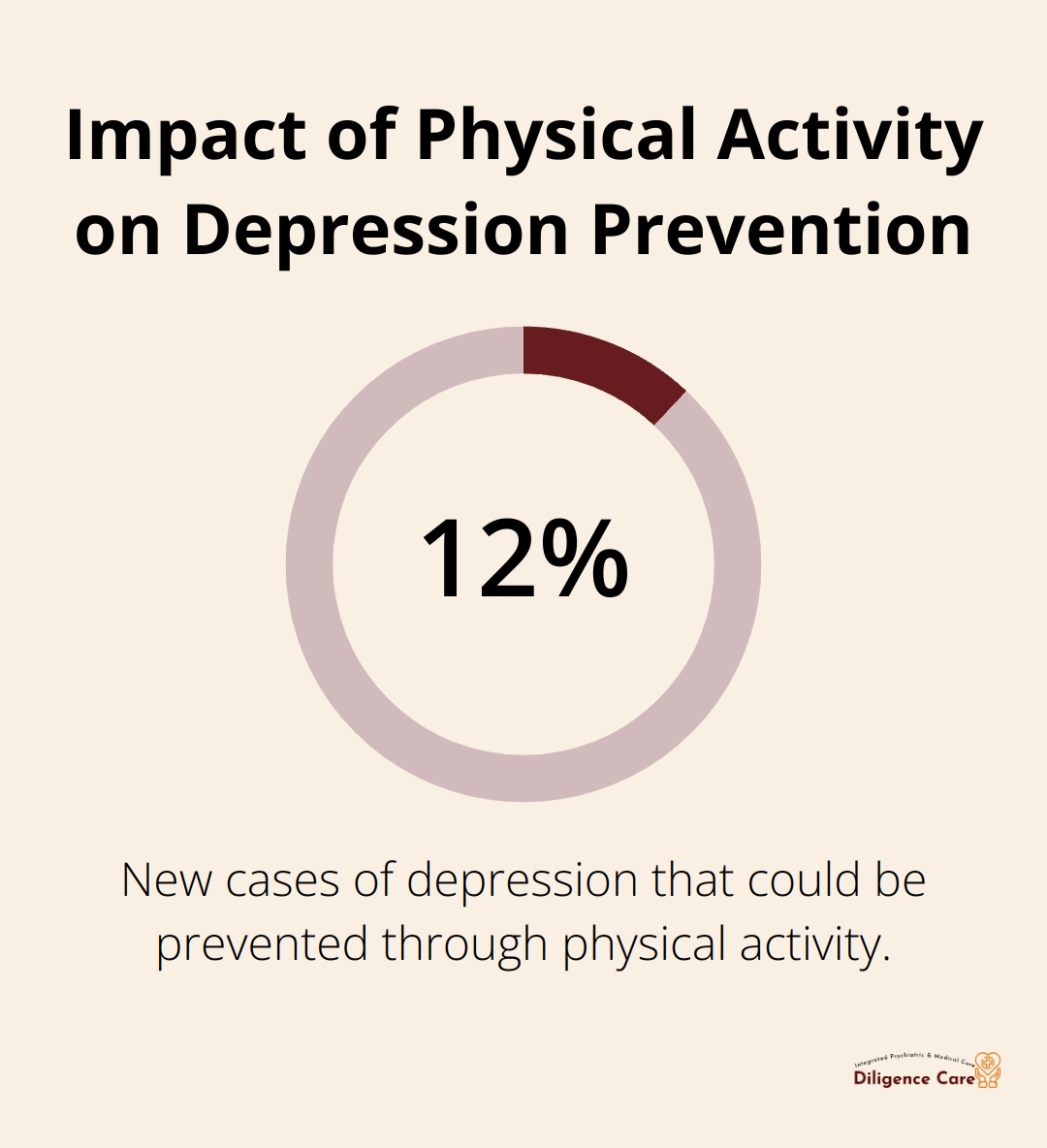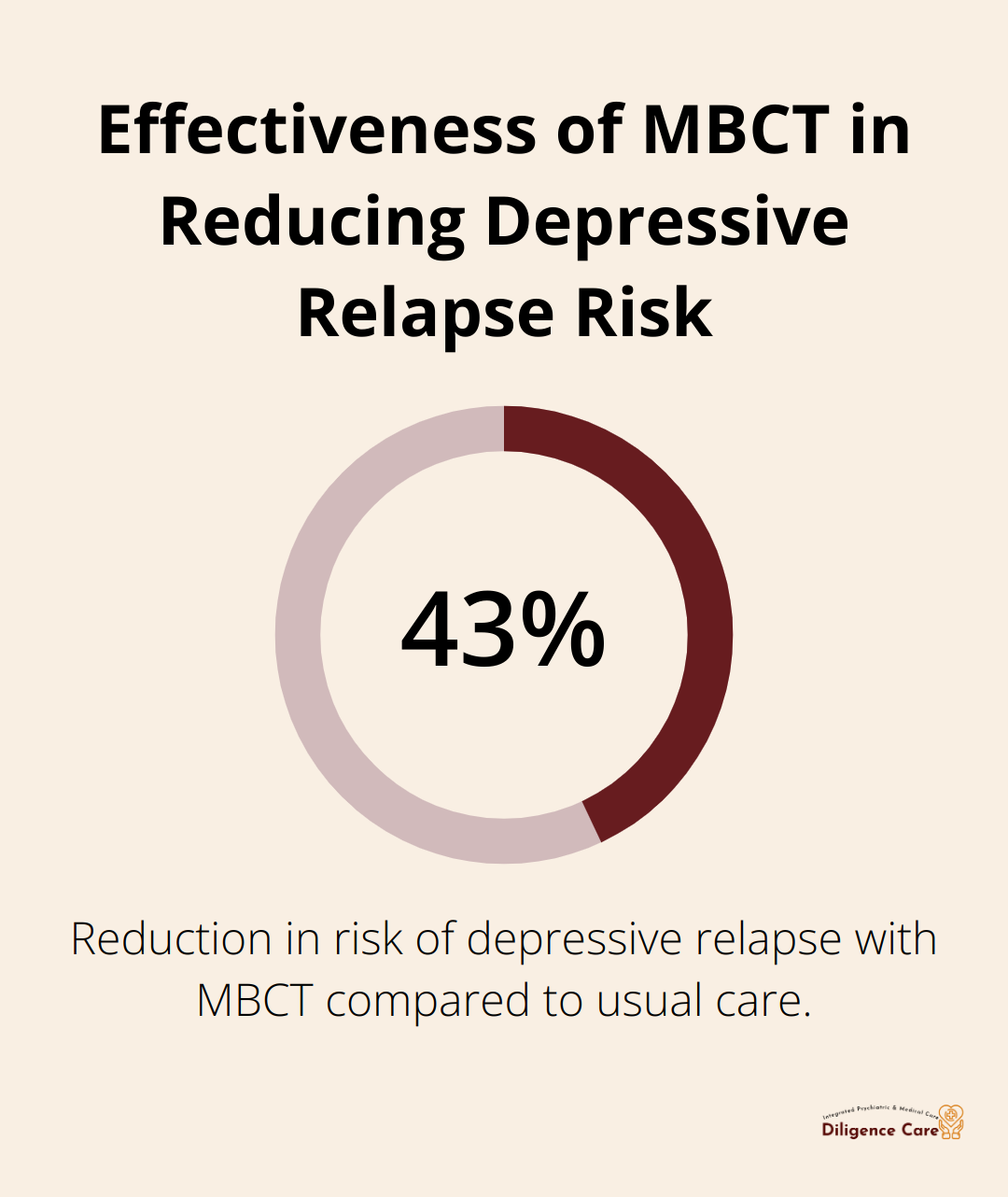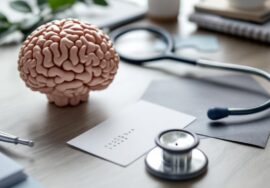
How to Treat Depression Without Medication
Depression affects millions worldwide, but medication isn’t the only solution. At Diligence Integrated Care, we believe in exploring non-pharmacological treatments for depression that can be just as effective.
From lifestyle changes to evidence-based therapies, there are numerous ways to manage depression without relying solely on medication. This blog post will guide you through some of the most effective non-medication approaches to treating depression.
Why Non-Medication Approaches Matter
The Power of Holistic Treatment
Depression treatment isn’t one-size-fits-all. Non-medication approaches can transform lives by addressing the root causes of depression. These methods offer a path to recovery that empowers patients and considers the whole person, not just their symptoms.
Dr. Bolanle Oluwadara, MD, emphasizes that depression often stems from a complex interplay of biological, psychological, and social factors. By addressing all these aspects, we can create more lasting change.
Non-medication approaches tap into the body’s natural healing abilities. For instance, regular exercise boosts endorphins, our body’s natural mood elevators. Anaerobic and aerobic exercises increase beta-endorphin, enkephalin, and dynorphin and have antidepressant effects.
Benefits Beyond Symptom Relief
Unlike medication, which primarily targets symptoms, non-medication approaches often provide additional benefits. Cognitive Behavioral Therapy (CBT) not only alleviates depressive symptoms but also equips patients with lifelong skills to manage stress and negative thinking patterns. Recent findings suggest that CCBT is a cost-effective strategy for treating depression in a diverse primary care population.
These approaches also tend to have fewer side effects than medications. While antidepressants can cause weight gain, sexual dysfunction, or sleep disturbances, therapies like mindfulness meditation improve overall well-being without such drawbacks.
Personalized Treatment Plans
Effective depression treatment requires a personalized approach. Mental health professionals (including specialists like Bernadette Akpengbe, PMHNP-BC, FNP-BC) should work closely with each patient to find the most effective combination of therapies.
A comprehensive assessment helps understand the full scope of a patient’s needs. This might include exploring lifestyle factors, past traumas, and current stressors. Based on this assessment, a combination of therapy, lifestyle changes, and complementary treatments (like acupuncture or yoga) might be recommended.

The Role of Professional Guidance
Seeking professional help is essential for effective depression treatment. While self-help strategies can be beneficial, working with experienced mental health professionals ensures evidence-based care tailored to your unique situation.
Integrating Non-Medication Approaches
The most effective treatment plans often combine various non-medication approaches. This might include regular exercise, therapy sessions (such as CBT or Interpersonal Therapy), and mindfulness practices (like meditation or yoga).
As we explore specific non-medication treatments in the next section, keep in mind that the most effective approach often combines multiple strategies. Let’s dive into some of the most promising lifestyle changes and evidence-based therapies for managing depression without medication.
Lifestyle Changes That Combat Depression
Depression management extends beyond therapy sessions. Simple yet powerful lifestyle adjustments can significantly improve your mental health. Let’s explore some effective strategies to enhance your well-being.
The Exercise-Mood Connection
Physical activity acts as a potent mood booster. A recent study estimated that up to 12% of new cases of depression could have been prevented through physical activity. Start small with a 10-minute walk to lift your spirits. Gradually increase to 30 minutes of moderate exercise five days a week.

Dr. Bolanle Oluwadara, MD (https://diligenceintegratedcare.com/providers/) often recommends activities like swimming, cycling, or dance classes. These activities not only improve mood but also provide opportunities for social interaction, another key factor in managing depression.
Sleep: Your Mental Health Ally
Poor sleep and depression often intertwine. Establishing a consistent sleep routine can break this cycle. Try to get 7-9 hours of sleep per night. Create a relaxing bedtime ritual – perhaps read a book or practice gentle stretches.
Avoid screens an hour before bed, as blue light can disrupt your sleep-wake cycle. If sleep problems persist, our specialist Bernadette Akpengbe, PMHNP-BC, FNP-BC (https://diligenceintegratedcare.com/providers/) can help develop a personalized sleep improvement plan.
Nutrition: Fuel for Your Mind
Your diet directly impacts your mood. A Mediterranean-style diet has been associated with a reduction of depression in older women. Omega-3 fatty acids, found in fish like salmon and sardines, particularly benefit brain health.
Limit processed foods, sugary snacks, and alcohol, which can exacerbate depressive symptoms. If you’re unsure about dietary changes, our team can provide guidance tailored to your needs and preferences.
Stress Management Techniques
Chronic stress can trigger and worsen depression. Incorporate stress-reduction techniques into your daily routine. Mindfulness meditation, for instance, has shown to reduce depressive symptoms by up to 20%.
Start with just five minutes of mindfulness practice daily. Focus on your breath, acknowledge thoughts without judgment. Gradually increase the duration as you become more comfortable with the practice.
Progressive muscle relaxation offers another effective technique. Tense and then relax each muscle group in your body, starting from your toes and moving up to your head. This can help release physical tension associated with stress and improve overall mood.
These lifestyle changes work best when combined with professional support. An integrated approach ensures you receive comprehensive care that addresses all aspects of your well-being. Whether through therapy, medication management, or lifestyle modifications, support exists for your journey towards better mental health.
Now, let’s explore some evidence-based therapies that complement these lifestyle changes in managing depression without medication.
Proven Therapies for Depression
At Diligence Integrated Care, we offer a range of evidence-based therapies that effectively treat depression without medication. These approaches have shown remarkable results in helping individuals manage their symptoms and improve their overall quality of life.
Cognitive Behavioral Therapy: Rewiring Thought Patterns
Cognitive Behavioral Therapy (CBT) is a cornerstone of depression treatment. This therapy focuses on identifying and changing negative thought patterns and behaviors that contribute to depression. Dr. Chijioke Iwuchukwu, MD, explains that CBT helps patients develop practical skills to cope with challenging situations and emotions.
A recent study examined the effectiveness of CBT in addressing mental health problems of children and adolescents in foster and institutional care. We tailor CBT sessions to each patient’s unique needs, addressing specific triggers and developing personalized coping strategies.
Interpersonal Therapy: Strengthening Relationships
Interpersonal Therapy (IPT) is another effective approach we use to treat depression. This short-term therapy focuses on improving interpersonal relationships and social functioning. Mavis Efuetngu, PMHNP-BC, APRN, notes that IPT can benefit individuals whose depression links to relationship issues, life transitions, or social isolation.
Recent research shows that youth randomized to family-based IPT evidenced significantly higher remission rates post-treatment compared to those in child-centered therapy (66% vs. 31%). Our therapists work closely with patients to identify and address interpersonal issues, helping them build stronger, more supportive relationships.
Mindfulness-Based Cognitive Therapy: Present-Moment Awareness
Mindfulness-Based Cognitive Therapy (MBCT) combines elements of CBT with mindfulness techniques. This approach helps patients become more aware of their thoughts and feelings without judgment, reducing the risk of depressive relapse.
A study in the Journal of Consulting and Clinical Psychology found that MBCT reduced the risk of depressive relapse by 43% compared to usual care. Eric Efuetngu, DNP, FNP-C, APRN, guides patients through MBCT techniques, teaching them to observe their thoughts and emotions without getting caught up in negative patterns.

Group Therapy: Shared Experiences, Collective Healing
Group therapy offers a unique opportunity for individuals to connect with others facing similar challenges. These sessions provide a supportive environment where patients can share experiences, learn from each other, and practice new coping skills.
Research in the Journal of Clinical Psychology shows that group therapy can be as effective as individual therapy for depression, with the added benefit of social support. Our group therapy sessions are led by experienced therapists who facilitate meaningful discussions and provide valuable insights.
Final Thoughts
Non-pharmacological treatments for depression offer effective alternatives to medication. Lifestyle changes, including exercise, sleep hygiene, and balanced nutrition, form the foundation of holistic depression management. These modifications, combined with therapies like Cognitive Behavioral Therapy and Mindfulness-Based Cognitive Therapy, can improve mental well-being significantly.
Diligence Integrated Care provides personalized treatment plans for depression. Our team of mental health professionals integrates various non-medication approaches to address the complex factors contributing to depression. We work closely with patients to develop strategies tailored to their unique needs and circumstances.
Professional help plays a vital role in managing depression effectively. While self-help strategies can benefit, working with mental health experts ensures evidence-based care. Our specialists at Diligence Integrated Care support you throughout your mental health journey, offering compassionate care and practical solutions to improve your overall well-being.











